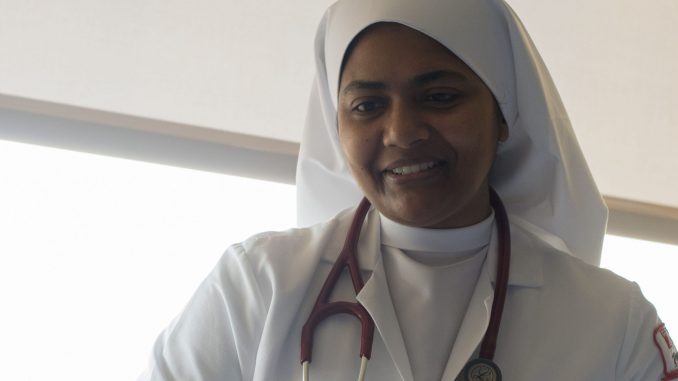
For many patients at Temple University Hospital, Sister Jocelyn Edathil is not just a physician, but also a source of spiritual comfort.
She works demanding, seven-day weeks at the hospital, but the work hours don’t stop there.
Edathil, a member of the Sisters of the Imitation of Christ congregation, also works at the St. Jude Syro-Malankara Catholic Church in Oak Lane.
Though the work-life balance can be challenging, she said her colleagues at TUH are understanding.
“Everyone is pretty supportive [and] accommodating,” she said. “I can do the ministry that I want to do. … It’s a struggle, but definitely manageable.”
Edathil’s roots with TUH run deep: both she and her sister were born at the hospital, and her mother worked there in 1991 as a nurse. But Edathil hadn’t planned to work at TUH — she applied to several other hospitals so her residency would be closer to her church.
“When I visited Temple for the first time, it was kind of off my radar,” she said.
She applied to TUH’s residency program because of its reputation for proficiency in clinical skills. The program fulfilled her expectations, but she said it was still a difficult decision. Her dedication to the sisterhood was her top priority.
Edathil considered moving to Chicago or New York to work in a convent, but encouragement from her family, church and mentors pushed her to pursue medicine.
“I was encouraged by quite a few hospitalists to continue on a hospitalists’ track,” she said. “I wanted to give back to the community that helped me.”
Edathil alternates her two jobs: she works seven days in a row at the hospital, and then seven days as a nun. She travels to New Jersey, where she focuses on women’s and youth ministries. She gives talks and guides the mother’s forum at her mission church and assists in guiding the activities of the Malankara Catholic Youth Movement. She also attends public speaking engagements and contributes to fundraising efforts for the church’s ministry in Ethiopia, where there is a clinic and a school.
Edathil’s extensive traveling enriched her perspective and medical knowledge, she said. Through her own private pilgrimages, she has traveled to 16 European countries, visited Rome three times and plans to visit Panama.
She began her religious formation — one of the steps in pursuing her vocation as a nun — in India. There, she worked at a leprosy clinic for a year and a half. The clinic focused on diagnoses and treatment, which was “much more cost-conscious.”
She added that she learned about the practice of medicine in underprivileged areas and the importance of physical examination in the process of diagnosis.
“[The experience was] nice exposure in terms of how medicine is practiced in different countries,” she said. “I’m open to practicing wherever God wants me to do, but it was nice to have this exposure.”
For Edathil, science and religion are directly correlated. A self-described “big nerd who carries around a periodic table,” Edathil said science was how she “fell in love with the Lord” in high school. In college, she managed to pursue both her faith and scientific interests.
From 1996 to 2000, she pursued her bachelor’s degree in chemistry at Villanova University, thinking she would become a professor. But instead, she chose to pursue medicine, later receiving a medical degree from Pennsylvania State University. She now also uses her ministry work to spread health literacy.
“My job is to heal and educate,” she said. “I usually try to make sure at the time of discharge to carefully explain in lay language the next steps and to help overcome barriers to care.”
She prays with patients who need it and does her best to listen to them fully, often under tight time constraints.
Edathil calls the process therapeutic listening.
“It’s a big sacrifice to just be patient and allow that patient just to vent,” she said. “Then, they trust you. Once that trust is broken, once that distrust is up, you’ve just affected how the patient can be healed.”
Edathil wears her habit — a set of head garments worn by nuns — while at work and said she’s faced little conflict in displaying her faith.
“Surprisingly it’s been very reasonably easy, most people don’t bat an eye when they see a sister,” she said. “I think that has a lot to do with the Temple population being very multicultural and tolerant.”
Early in her residency at TUH, she gave too much insulin to a patient and his blood sugar dropped. She was distraught and expected her superiors to reprimand her. Instead, the Residency Program Director Dr. Darilyn Moyer took her aside and gave her a hug.
“Every physician makes mistakes,” Edathil said the director told her. “This mistake will make you a better physician, and I know you’ll never make this mistake again.”
Not only did she never make that error again, Edathil said she learned about forgiveness toward others and herself. Now, she passes the same advice to residents and interns.
“We all make mistakes, and we just have to go forward,” Edathil said.



Be the first to comment